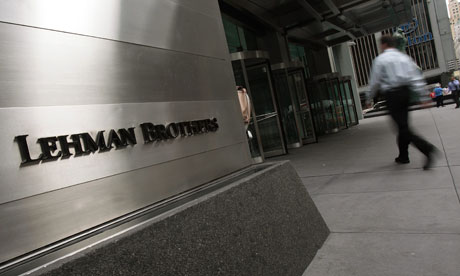The World Bank has warned that the crisis in the eurozone will lead to a sharp slowdown in growth in rich and poor countries this year and could spiral into a rerun of the 2008-09 recession.
In its half-yearly health check on the global economy the Washington-based institution said the world had "entered a very difficult phase characterised by significant downside risks and fragility". The bank lowered its forecast for global growth in 2012 from 3.4% to 2.5% but said governments should be preparing for a downturn as bad as that which followed the collapse of Lehman Brothers in 2008.
"An escalation of the crisis would spare no one," said Andrew Burns, manager of global macroeconomics at the World bank and the report's author. "Developed and developing country growth rates could fall by as much or more than in 2008-09. The importance of contingency planning cannot be stressed enough. It is clear that whatever probability is attached to this downside scenario, it has increased since June last year.
"Developing countries should hope for the best and plan for the worst. If these downside risks materialised there is not much developing countries can do to prevent it. But they can prepare for it." He added that such countries should be drawing up list of public spending priorities and stress testing their banks.
The forecasts contained in the half-yearly Global Economic Prospects report reflect the slowdown in the global economy seen in the second half of 2011, which was already evident in weakening trade flows, declining capital flows to developing countries and lower commodity prices. A similar picture is likely to be painted by the bank's sister organisation, the International Monetary Fund, when it releases updated predictions for global growth next week.
The bank said the eurozone was already in recession and was likely to contract by 0.3% this year. High-income countries would grow by 1.4% as a result of a recovery in Japan from a tsunami-affected 2011 and a slight pickup in activity in the US. Even so, rich countries are expected to grow in 2012 at only half the 2.7% expected when the Bank last published forecasts in June 2011.
It added that there had also been a slackening in the pace of activity in some of the leading developing countries – such as Brazil, India and Turkey – as a result of action taken by governments to tackle inflation. There was a risk, the bank said, of the crisis in the eurozone and weaker growth in developing countries reinforcing each other at a time when the ability of policymakers to respond to a downturn was much diminished compared with three years ago.
"While contained for the moment, the risk of a much broader freezing up of capital markets and a global crisis similar in magnitude to the Lehman crisis remains," the World Bank report said. "In particular, the willingness of markets to finance the deficits and maturing debt of high-income countries cannot be assured. Should more countries find themselves denied such financing, a much wider financial crisis that could engulf private banks and other financial institutions on both sides of the Atlantic cannot be ruled out. The world could be thrown into recession as large or even larger than that of 2008-09."
A second global downturn would again have its epicentre in high-income countries, it said, but it added that developing countries would feel its effects deeply through trade, commodity prices, remittances, financial pressures and capital flows. Many developing countries would see outright falls in output and overall developing country gross domestic product in 2013 would be more than 4% lower than in the bank's baseline projection.
"In the event of a major crisis, activity is unlikely to bounce back as quickly as it did in 2008-09, in part because high-income countries will not have the fiscal resources to launch as strong a counter-cyclical policy response as in 2008-09 or to offer the same level of support to troubled financial institutions. Developing countries would also have much less fiscal space than in 2008 with which to react to a global slowdown (38% of developing countries are estimated to have a government deficit of 4% or more of GDP in 2011). As a result, if financial conditions deteriorate, many of these countries could be forced to cut spending pro-cyclically, thereby exacerbating the cycle."
The co-ordinated global response to the 2008-09 slump saw interest rates slashed, money created through quantitative easing, public spending increased and taxes cut. "Monetary policy in high-income countries will also not be able to respond as forcibly as in 2008-09, given the already large expansion of central bank balance sheets," the Bank said. "Among developing countries, many countries have tightened monetary policy, and would be able to relax policy (and in some cases already have) if conditions were to deteriorate sharply."
Burns said China had the resources and the political will to mount a counter-cyclical policy, but was unlikely to be able to boost its economy as quickly as it did three years ago. "There was a big response in 2008-09 but it is not obvious that the same mechanisms can be used as effectively as they were in 2008-09. Those parts of the economy that were stimulated in 2008-09 are already over-heating."











